Character Status Thingies and The Good Wife
Sooooooo I've been zipping through The Good Wife (and failing to realise or deal at all with the fact that The Walking Dead is back; I am a Multitasker or at the very least a Multifailer), despite not being at all invested in the story. Or any of the characters, really, I mean, I don't wish them ill, but I can't find it in me to really care what they want, why they can't have it, and what they're going to do about it. (This goes double for anyone with the last name of Florrick, unfortunately.) HOWEVER. Whoever is casting this show has some kind of direct line to my id and is scratching it behind the ears like a mofo. (I'm pretty sure I'm not alone in this.) I have never encountered a supporting cast more overwhelmingly RTMI. I thought the squeaks I made when Alan Cumming and Gary Cole both first showed up in the same episode were undignified; little did I know what sounds I would turn out to be capable of when they just, oh, threw Eddie Izzard into a random episode as you do. !!!
So it's been a parade of delight in faces that I would put up with a GREAT DEAL to see on my screen - anchored by mainstays Christine Baranski, Josh Charles, Matt Czuchry, and Archie Panjabi, who are all astronomically high on that list (and while I don't have that previous interest in Julianna Margulies and Chris Noth, they are both also plenty enjoyable to watch) - and for the most part, TGW is not overtaxing in what it's asking me to put up with. The show was mostly moreish handfuls of eye- and brain-candy, yet six-odd seasons' worth of handfuls still ended up accumulating into enough Character Status Thoughts to burble out, at least relative to my Lost Girl complaints from last time. (Plus, the excessive use of gifs makes a return, huzzah. And, stuff.)
Alicia and cohorts may even be a better comparison for Bo and similar than what Orphan Black offers; like Bo, Alicia is the Central Moral Hero of the narrative who commands the respect, admiration and often love of pretty much everyone (important) around her by being just that special. However, unlike Lost Girl, which keeps insisting Bo really is all that and a bag of chips, but never quite manages to show it, TGW is stringent in making Alicia demonstrate the basis for her Little Miss Special status (and thus creates an internally logical and consistent story), while, in the background, making the odd poke and prod at the reality below this exemplary "Good Wife" exterior they (and she) have presented.¹
HOW. EVER. While all this is good and analytical and whatnot, and I'll get back to it all in a minute - first, I need to TALK SHIPPING and also to FACEPALM, because DAMN IT.
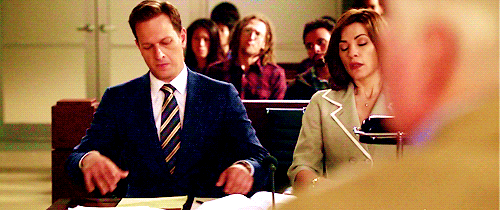
(Even the guy in the back is feeling the facepalm. Yeah, guy. I KNOW.)
Okay. Before anyone gets tooo super-anxious over the possible source of my shipping distress, I'll nip any sympathy by noting that I went into all this already knowing the Great Honking Spoiler, and so was the furthest from blindsided by it as is possible, and was actually actively looking forward to it. Not just because my real reason for finally sitting down and watching the show was to get a Matthew Goode fix (I didn't initally realise it would be such a roundabout affair to get there, but having Josh Charles instantly reconciled me to that), but also because by the end of S4 Josh Charles just didn't seem to be having any fun with any of it anymore. The prospect of being written out in S5 really seemed to reinvigorate his performance, and I LOVED that Will. Fun!Will is The Best, maybe my favourite character on the show, if only by a nose. (It is a GREAT nose tho.)
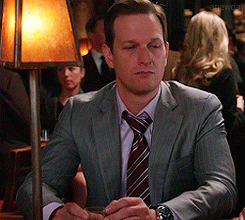
So I came to this totally primed by the Matthew Goode Factor and the proliferation of slightly-incomprehensible flirty gifsets and The Internet In General to be Team Alicia/Finn ... and it has backfired utterly. I like Finn just fine, and I'm happy to be watching Goode even though he's not onscreen nearly enough for my purposes, but I'm just not getting any of the ballyhooed chemistry from the ship at all. Zilch. Which is a bit weird, considering the show itself is playing it to the hilt - it even has the two of them setting Firm Rules so as to not act on all this Intense Attraction, which rather took me by surprise because I was still waiting for the Intense Attraction to be established. Talk about blindsided. I'm assuming that the (miraculously unspoiled) suckerpunch wallop of Will's death made the viewers latch onto Finn as quickly and deeply as Alicia herself did, and while on an intellectual level I was watching with interest how the show constructed that character handoff, I wasn't in that emotional space at all.
Which is not their fault, that I've been left behind the SPEEDing bus of *intense circumstances* that this relationship was started under, but it kind of is their fault that that was the only goundwork and 50mph propellant the relationship was given, and now I'm just having to take these characters' words for it that they jumped the 50ft of unfinished characterisation freeway that I fell through, and that they're zooming around out there somewhere for the duration. But as for me, I totally missed the boat on that 'ship. I AM ON NONE OF THE MODES OF TRANSPORT. And I was so ready to embark, too - just one towline trailing in its wake, that's all I ask, I'll do all the work to haul myself onboard I promise. If only for the Goode Ship Matthew. (Also promise: I will hereby stop with all the mixed vehicular and SPEED analogies.)
And if that all weren't enough for a solid *facepalm*, this new Campaign Manager Guy Who Isn't Eli then shows up for Alicia and zing, straightaway I am Super Into It. FACE. PALM. And ... then they go and have Alicia mack on him in her Uncharacteristic Moment Of Wild Exuberance, and he's all ?!, and awkward about it with her, until she's all lemme set the record straight: it was NBD, and then suddenly *eye contact* and they've caught on each other in some kind of A Moment and neither of them quite knows WTF and so they're just eye-locked and discombobulated, and it is like SHIPPING CATNIP to me, I can't even tell you. Now I want things. WHAT IS HAPPENING.
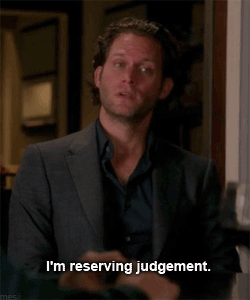
Pictured: not me.
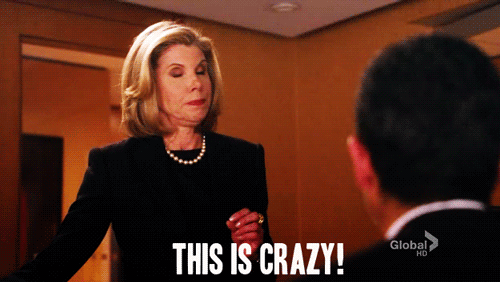
I have a strong suspicion that Campaign Manager Guy Who Isn't Eli (John? Johnny? Something. I'll look it up.) is here to be an Obstacle to eventual Alicia/Finn, because currently there are no internal Obstacles, only external ones, and this will create Conflict for them to Overcome. I don't want to be invested in the Obstacleship, damn it. If that turns out to be the case, I'll go ahead and pronounce that an atrocity eez 'appening.
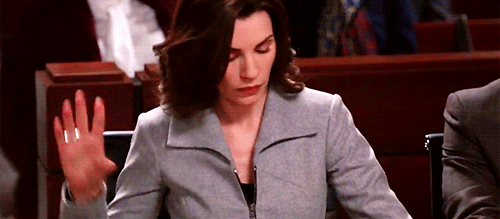
... Or, you know. Whatever. I maaaaybe might be overreacting since the great draw of this show for me is just letting the parade of appealing actors saying entertaining things and making amusing faces wash over me like so much charming white noise. So suddenly caring - even just a little bit, this late in the game - came as a bit of a shock. Who knows, maybe this Johnny Elfman (Elfman, really? I mean, exactly how clear are they being that he's not a heavyweight in this situation? Also, ha, that's why he looked familiar, Sean Garrity on Rescue Me, mmmmm yes casting thankyou more plz) is my Will-transference character. And not just shipping-wise, and that not just because shipping is (usually) a second-at-best consideration for me on this show. Character-wise, he's in the Will Template - unlike Finn - and as it turns out, the show really needs that role to balance out its cast equation and general tone and stuff.
Oh hey. Let's talk about that!
Now, just to note what material I'm working from here: I have not seen the last couple of episodes, since the first one back from the mid-S6 hiatus, because as it turns out watching these episodes spaced out one at a time is an exercise in tedium, at least for what I'm here for, although I've caught some of the review-type reactions to them (okay, mostly over at GFY, because BEST). So, naturally, I managed to pause my watching at the exact point when they make the question of Alicia's largely-hidden inner life/eye the text of a whole episode. Because of course I did. I am curious to see how that episode matches up with my read of what they've done up to this point - just, not curious enough to bother picking the series up again until I have enough backlog to binge it. So at some point I'll probably come back and update with a note of how well I've caught what they've been saying about their subject. Or not. Whatever.
The very basic theme of this show, centred on Alicia, seems to be appearance vs underlying reality - and, like Alicia, absolutely pours itself into the very real function of appearance, sparing very little attention for her inner reality, and not much more for that of those around her. It's not that the tension between appearance and reality doesn't hit hard in the mechanics of the show - it very much does, starting right out of the gate with Peter's infidelity and other criminal activities bringing everything crashing down. But unlike appearance, the basic facts of reality (and, crucially, people) largely can't be controlled, and so Alicia wants nothing of it.
The show deliberately enables her near-pathological preoccupation with appearance, stopping short just enough to hint at her denial, but very sympathetically so - even when questioning, it never condemns her for it. Even when it periodically brings reality in to do its thing and smash apart her very carefully controlled appearance-based world, the tone and framing of it sides with her; reality is harsh, capricious, messy, cruel, unfair. Moreover, Alicia isn't venally interested in appearances for their own sake, it's stability that she craves (courtesy of her messy, unreliable mother, teaching Alicia to trust in plans more than people's love) and commits herself to. Working with maleable appearances is the means to that end, an approach this show presents as thoroughly understandable, even if it means doing things that are not laudable. In any case, no one has yet been shown to offer anything better or more effective for dealing with reality's vagaries.
Not least because the arenas it's chosen are ones where appearances are wielded in order to dictate reality's outcome: law, politics, and to an extent family too. They are also highly structured, within which a high measure of control can be wrested by how well you can plan your way through them. No wonder Alicia's instincts led her to them, and that she has trained herself to excel at navigating them. (Family, the more organic arena that has more built-in baggage and resistance to the attempts to impose appearance over reality, is unsurprisingly her weakest area.) It doesn't matter if a client is innocent, what matters - what ultimately determines the outcome in reality - is whether the lawyers can prove - or seem to prove - them so. Likewise in negotiating settlements, etc, what determines the outcome is how the clients' relative positions appear, and that is what the lawyers are all attempting to bluff and manipulate to their best advantage. Lawyering consists of making the case, not establishing the truth. (See also: anything to do with politics, most especially campaigning, resulting very much in the real power to control aspects of reality.)²
There's a whole long segue there exploring this show's morality structure and worldview, but I've segued enough considering I've been trying to get to the character calculus. To sum up: this show respects principle, respects the hell out of it - and those who demonstrate it - but doesn't believe in it. And neither does Alicia, even though the appearance of it has served her very, very well, not least for her own self image. The real progress of the show has been the very quiet, very gradual dismantling of that self image as she is lured by inches toward outright "real" power, instead of just appearance, for securing stability. Of course, the law/politics/both nature of that power still depends on appearance to achieve, and thus we travel further into the maze between appearance and reality. It also strongly implies that this is the natural, and in fact inevitable, progression of anyone who seeks to grasp and wield any kind of influence, as illusion is slowly worn down:
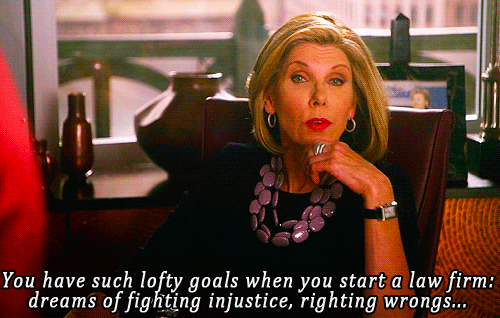
(See also: how long Florrick Agos (Lockhart) lasted in their cockroach!romantic funky independent new startup before being sucked right back into the old LGS offices.)
Naturally, the show begins in the aftermath of Alicia's forcible eviction from - and betrayal by - the appearance-based cocoon that Peter and his plans sustained around their family, that allowed her to maintain that Good Wife image of herself unchallenged either by internal or external reality. (No wonder she loved him, and had such a hard time moving on from him.) Not that she's giving up that image of herself without one hell of a fight, but her current political campaign storyline is doing quite a number on forcing her to confront at least some of the reality of how far she's drifted from it (another reason I'm enamoured with Johnny, but we'll get back to that, I'm sure).
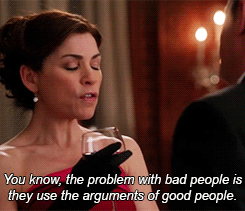
How's that self-awareness coming, Alicia?
(Actually, and to finish summing up, the highest virtue in this show's and Alicia's moral hierarchy is loyalty. Which, apart from Smart Articulate People doing Smart Articulate Things, is its point of contact with The West Wing, whose high-minded idealism I suspect TGW respects the hell out of, but doesn't believe in....
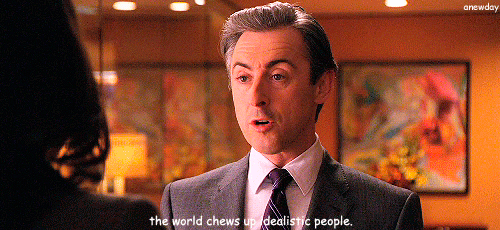
*cough* O HAI ELI
... The next highest virtue is probably self-control, the development of which signifies maturity (ie, Cary), and which can pass for principle in the right light (which appearance-minded people (and shows) are very good at finding and staying in as much as possible).
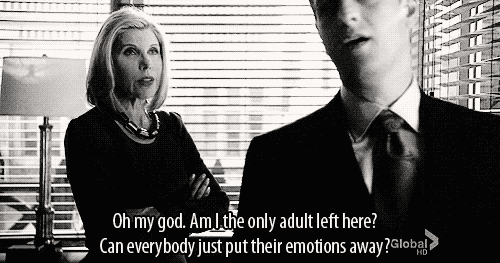
- Both virtues being ones that undergird stability.)
IN ANY CASE, before all that gif!waffling, the direction I was originally taking that whole appearance-over-reality preoccupation is that it's not just the show's theme but its style, too. Not at all a bad thing, it has a great time in playing around with it endlessly, and doesn't hesitate to make sassy, affectionate fun of itself as well its subject, but at the same time, the authorial voice of this show is itself fairly cool. It's not quite as reserved and controlled as Alicia herself, but is extremely precise in crafting its outward story - though they remain flexible in what they're willing to try out as they go, provided it remains within the purview of their larger plan - skillfully inhabiting its very attractive and flirty skin, regardless of missteps. And they are similarly sparing with any underlying substance, so that it wasn't until the second season that they gave us any solid insight into what's under Alicia's surface and what made her that way in the first place, introducing Alicia's little brother, Owen, to point right at it. Irreverent, loving, holding the keys to Alicia's past and a uniquely trusted position in her life, he is perfectly able and willing to poke the things she's trying to hide from.
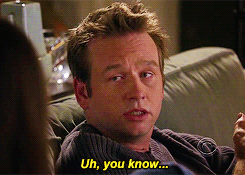
OWEN ILUUUUUUUUUUUUUUU
(/MILTOOONNNNN ILU <333 seriously this show's cast hngh)
But they keep those kinds of characters/instances few and far between (I think the creators' argument was for only going to that kind of thing when it's justified by the situation, not crowbarring it in for the sake of having it), leaving the surface intact most of the time, resulting in characters that aren't shallow so much as thin. Any layering of underlying substance comes almost entirely from what the actors themselves bring to their performances.³ Given the cast they've assembled, relying on them for that is far from a losing proposition, and suiting cast to writing is all part of creating a viable show as a whole. Embracing how their actors embody their characters ended up taking them in some gorgeous, and far less clichéd, directions (most especially Diane). So, for example, while the writing provided a very workable framework for it, the magnetism simmering under the surface of Will and Alicia's relationship came largely from Josh Charles and Julianna Margulies's chemistry and pre-existing friendship, which imported the depth of an entire implied history into all their interactions.
Somewhere online I saw someone point out that Will was unusual amongst the regular cast in that he was a warm character, contrasted with how calculated Alicia, Cary, Diane, Kalinda, Peter, and even Eli are, "cool" sometimes to the point of being closed off in the way they approach interactions and relationships. Not that any of them don't have internal warmth, or never willingly open up, but such instances are rare, where Will tended far more to wear his heart on his sleeve. Losing Will created a tonal shift, and also lost the unique interactions that he, as the temperament-foil for the others, was able to elicit.
(Yes, Gary Cole's ballistics expert, the straight-shootin' (ha!) cowboy, is downright hot (hur!) even compared to Will, but in his limited appearances his meaningful interactions are all with Diane.
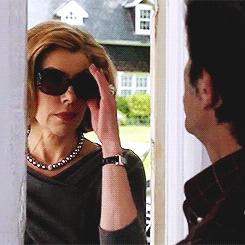
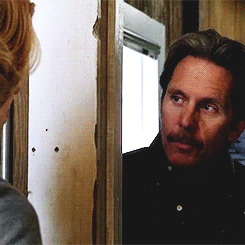
Though for the record I'd like to make it clear that NO ONE HERE IS OBJECTING ON THAT SCORE.)
I figure Will being the Asshole With A Heart type was intentional, given how they went for Josh Charles and all his transparent warmth and charm and sensitivity, much like they got Chris Noth for Peter's commanding charisma. I'm not so sure how much they planned for him to become so embedded in his status as heart of the show (to Alicia being the mind), but between his friendship/partnership with Diane, his history and relationship with Alicia, and mutual loyalty with Kalinda, he ended up being the central anchor in the web of relationships of the inner circle of characters.
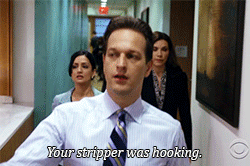

(Alicia and Diane being the main hubs that, between them, cover almost everyone.)
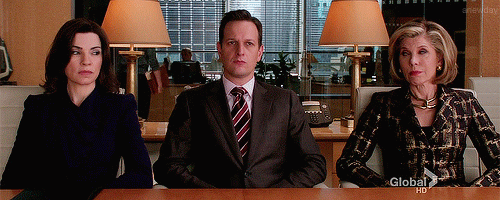
The thing they probably didn't foresee was his amazing chemistry with Diane which helped make them the most enduring and ultimately trusting relationship on the show, becoming the deepest relationship anchor for that much-desired stability amongst the many, many surface shifts.


Why yes, I could have gone and found more specific gifs of the other two relationships. But, CHRISTINE BARANSKI.
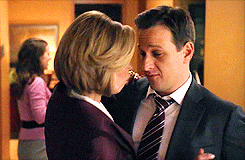
I rest my case, Your Honour.
And as such, his role/status in the story's equation desperately needs to be replaced. Despite Will's death, Cary's arrest and trial, and the series of staffing sleights-of-hand forcibly Getting The Band Back Together, the threads of the story and the characters in them feel adrift with little to connect them.⁴ If, as I imagine, the plot was always intended to get Alicia on Peter's path as State's Attorney (and however far beyond - the show hasn't been shy with the Hillary references), the key connecting thread keeping her relationship with her old firm alive and more than professionally adversarial - as it would become between her, and Diane and Cary - would be her fraught relationship with Will.
(Similarly, it's hard to imagine he wasn't going to be her endgame reward, partially because this show badly wants Alicia to get the luscious mancandy of her choice (can't argue with that), but also because of how consistently they showed him sacrificing his own interests with her (reality!), for her, while hiding it (appearances!) so that he never tried to claim credit for it, always leaving the choice, the control, of their personal relationship in Alicia's hands - the kind of (stable! unconditional!) love Alicia wanted from Peter and never fully received. Not only that, but he was stable enough in himself to be able to accept and take in stride the inherent instabilities Alicia fears -
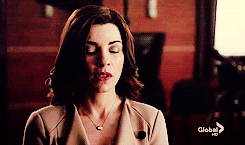
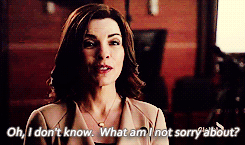
- a quality that attracts and fascinates her, even as it scares her off, because she just can't see how he could possibly take what she so deeply fears seriously and because he's not susceptible to all her strategies to manage it. He has no plan, no stability to offer her other than I love you, and she wants and fears that the most - presumably by the end of the series, she would have grown to the point where she could accept that, at which point their "bad timing" issue would spontaneously sort itself out since she would stop subconsciously resisting/sabotaging their full potential relationship.)
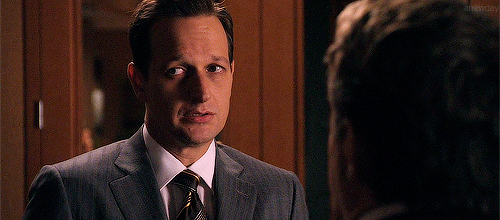
OH WELL
Enter Finn.
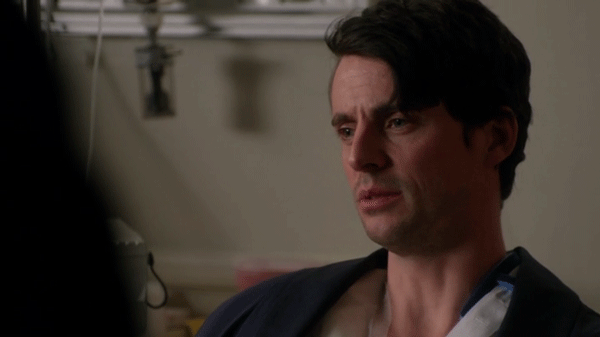
Who, as the story's heart transplant, has to come out of nowhere and go from complete outsider to central anchor, and is being positioned there as fast as humanly possible within the pace of the show without breaking disbelief (thankfully, the show is practiced at shuffling people around post-haste). They've loaded him up with all the emotional capital and continuance they could possibly transfer from Will and Will's death, and put him as far from Asshole territory as someone on this show can get (while keeping him tough and smart and competent, and also unflappable and uninhibited while they're at it so that he can remain unentangled from all Alicia's messy issues) so as not to risk spilling any of it. (Will can get away with Asshole; they clearly judged that a newcomer Alicia is to rapidly and enduringly desire in acceptable fashion probably can't.)
They fast-tracked him through a unique, significant and emotionally vulnerable connection with Alicia that can serve as a functional simulation of her history with Will and set up a desireable future between them, before moving him out of that dedicated isolation and into proximity with Florrick Agos Lockhart to begin forming connections with the rest of the cast, also making him more rounded (highest priority obviously being Diane, which I look forward to greatly), until he can join the firm properly in time to key-anchor Alicia to it when she leaves, keeping the two sides of the court of law connected as her relationship to Peter did in the earlier seasons. (Before I thought about it, I was briefly hopeful that he'd go back to prosecute under Alicia, but if I'm right about the show being as reluctant to abandon its plans once they're made as Alicia is (stability!), slotting him into Will's place rather than plotting a new course with him, there is no way that's happening. Who knows, though. They might surprise us.)

Pictured: me.
And because they are casting geniuses, they got Matthew Goode for it, who can do all the necessary warmth and charm like nobody's business, although his warmth isn't deeply inherent like Josh Charles's is - he can flip it like a switch. (Not the charm, though. Dude couldn't even turn that off in Leap Year (the things I'll watch for a Goode fix, I tell you), and he was barely more than going through the motions in that one.) Which might be contributing to the facile fantasy vibe I'm getting off him. No matter; in the circumstances, it was an inspired choice for emergency replacement luscious mancandy.
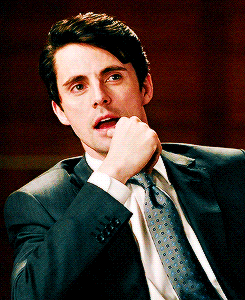
Well played with a difficult hand, TGW. You keep bringing me these pretty, pretty surfaces, and I'll quite happily watch how things continue to play out from my very comfortable bingeing-not-caring vantage. (Though short hair on Goode, for preference.)
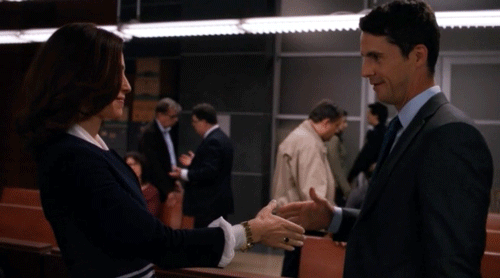
IT'S A DEAL
... HOWEVER. That still leaves me languishing (somewhat) in this Johnny Situation. I'd like to sort it out, so I can be done. With the caring. (Mmmmrm cast!candy.) Except this post is close to overloaded as it is ... eh. I guess if I still feel strongly about it I'll come back to that bit later and try and get it out of my system.
¹ I find it interesting, looking back at this, that so far I've tackled only stories with female protagonists positioned - uncritically - as their Central Moral Hero, and the character status calculus around that. There's probably something to be said for the proliferation of shows with female protagonists enjoying the same automatic CMH status as male protagonists used to have (even if numerically it's still on a lesser scale), where at the same time the current acclaimed male protagonist shows are mostly ones busily deconstructing that automatic status. However, if it's going to be said, it's going to be said in some other post, because good gravy. Except to note that in TGW's case, it is subtly acknowledging that trend of deconstruction by putting question marks against Alicia's choices, but its main focus still firmly embraces Alicia as its CMH; it is secure that its moral landscape is consistent and sympathetic to her legitimately occupying that CMH position/arc within it by laying out how very cynical and grey the landscape itself is.
² The characters who are the most fluid in embracing appearance over reality (and are most able to play reality for its appearance) are consistently the most threatening of Alicia and co's opponents, Louis Canning and Patti Nyholm. Interestingly, about the only two characters who - in their own ways - fully embrace reality over appearance are consistently the most effective of Alicia's allies: Kalinda and Elsbeth Tascioni. (But then, Elsbeth is a cuh-ray-zee genius whose mind demonstrably works in ways no one else can hope to understand, and is therefore a statistically irrelevant anomaly in this world, and Kalinda never, ever emerges from her secretive realm of the world's seedy underbelly, aka, unvarnished reality as this show renders it.)
Meanwhile, the two most enduring and successful of Alicia's clients are the eternally oscillating, always-playing-for-appearances Colin Sweeny (so much about appearances that the latest of his episodes went for meta-broke and had him suing a tv series for making a ripped-from-the-headlines episode based on a murder we're almost certain he actually did (the show also taking the opportunity to contrast/satirize "Saint Alicia" in their show-within-a-show while they were at it), featuring the blowhard testimony of an identical look-alike actor who played him), and the utterly unbending, never-playing, drug kingpin Lemond Bishop, the only person who truly intimidates fellow seedy-underbelly-lurker Kalinda - both of whom prize Alicia uniquely above all her colleagues. Her most formidable political opponent is so good at marrying reality and appearance it's taken us half a season to discover whether he's acting off principle or self interest (principle, it turns out, which suggests to me that he's going to lose this election unless he gets over that [ETA: according to the latest GFY recap that I didn't manage to stop myself from skimming the beginning of, yep, he lost]). The one truly "good", principled character we've got at the moment seems to be Finn, who is more fantasy than person (especially to Alicia), who, in that way fantasies have, we actually know next to nothing about.
³ I wasn't sure whether this was just me, being not engaged enough with the show's wavelength to pick up all the sub-surface nuances of what it was laying down, but this recent GFY review put that question to rest (bolding mine):
I’m doing this week’s recap as a Winners and Losers list instead of as a ranking, because the show got drunk on its own fancy and did a boutique-y episode that made the regular format too hard. A couple times earlier in the season, Alicia would imagine people talking to her, in an attempt to give her an inner life. Apparently The Good Wife liked that new toy, because most of this hour takes place, as the title suggests, in Alicia’s mind’s eye.
Which honestly sounds more like an extension of what they were doing more subtly with Owen et al, but obviously wanted to explore more directly without having to change their majority surface approach. They're simply annexing (otherwise unjustified) exposition of the depth that nominally lives under the surface, and then presumably dropping it again until the next time they decide they want it. Which works for them and their story - Alicia actively suppressed her inner life in service of Peter's Plans and her stable appearance/role as Good Wife (And Mother), before post-Peter events forced her own wants and desires back into play, to still be resisted as much as possible because to act on them is to be like her mother. Even having them feels suspect, possiby even shameful, in her stability/control-based personal morality.
⁴ The reason the early seasons were the best (particularly the second) was not so much the story threads themselves but how the major relationship threads within them were, despite the skirmishing, by and large pulling the characters toward each other, and this show's greatest strength is the chemistry of their actors bouncing around against each other. Though the "family" notion of the law firm was occasionally derrided, that sense of people sometimes being at odds but, in the end, bound together by some greater common purpose, was the emotional foundation of our investment in this group of characters. The ensuing schisming of connections and loyalties, though useful in shaking things up and providing more motion plot-wise, unfortunately made a much higher percentage of the interactions antagonistic with little to sweeten or balance them out, or make them pull back together. It made the show's conflict feel like little more than so much ... stuff, happening. So while they kept things clicking along and avoided the events the characters were involved in ever becoming exactly stale, they still felt spoiled.
So it's been a parade of delight in faces that I would put up with a GREAT DEAL to see on my screen - anchored by mainstays Christine Baranski, Josh Charles, Matt Czuchry, and Archie Panjabi, who are all astronomically high on that list (and while I don't have that previous interest in Julianna Margulies and Chris Noth, they are both also plenty enjoyable to watch) - and for the most part, TGW is not overtaxing in what it's asking me to put up with. The show was mostly moreish handfuls of eye- and brain-candy, yet six-odd seasons' worth of handfuls still ended up accumulating into enough Character Status Thoughts to burble out, at least relative to my Lost Girl complaints from last time. (Plus, the excessive use of gifs makes a return, huzzah. And, stuff.)
Alicia and cohorts may even be a better comparison for Bo and similar than what Orphan Black offers; like Bo, Alicia is the Central Moral Hero of the narrative who commands the respect, admiration and often love of pretty much everyone (important) around her by being just that special. However, unlike Lost Girl, which keeps insisting Bo really is all that and a bag of chips, but never quite manages to show it, TGW is stringent in making Alicia demonstrate the basis for her Little Miss Special status (and thus creates an internally logical and consistent story), while, in the background, making the odd poke and prod at the reality below this exemplary "Good Wife" exterior they (and she) have presented.¹
HOW. EVER. While all this is good and analytical and whatnot, and I'll get back to it all in a minute - first, I need to TALK SHIPPING and also to FACEPALM, because DAMN IT.

(Even the guy in the back is feeling the facepalm. Yeah, guy. I KNOW.)
Okay. Before anyone gets tooo super-anxious over the possible source of my shipping distress, I'll nip any sympathy by noting that I went into all this already knowing the Great Honking Spoiler, and so was the furthest from blindsided by it as is possible, and was actually actively looking forward to it. Not just because my real reason for finally sitting down and watching the show was to get a Matthew Goode fix (I didn't initally realise it would be such a roundabout affair to get there, but having Josh Charles instantly reconciled me to that), but also because by the end of S4 Josh Charles just didn't seem to be having any fun with any of it anymore. The prospect of being written out in S5 really seemed to reinvigorate his performance, and I LOVED that Will. Fun!Will is The Best, maybe my favourite character on the show, if only by a nose. (It is a GREAT nose tho.)

So I came to this totally primed by the Matthew Goode Factor and the proliferation of slightly-incomprehensible flirty gifsets and The Internet In General to be Team Alicia/Finn ... and it has backfired utterly. I like Finn just fine, and I'm happy to be watching Goode even though he's not onscreen nearly enough for my purposes, but I'm just not getting any of the ballyhooed chemistry from the ship at all. Zilch. Which is a bit weird, considering the show itself is playing it to the hilt - it even has the two of them setting Firm Rules so as to not act on all this Intense Attraction, which rather took me by surprise because I was still waiting for the Intense Attraction to be established. Talk about blindsided. I'm assuming that the (miraculously unspoiled) suckerpunch wallop of Will's death made the viewers latch onto Finn as quickly and deeply as Alicia herself did, and while on an intellectual level I was watching with interest how the show constructed that character handoff, I wasn't in that emotional space at all.
Which is not their fault, that I've been left behind the SPEEDing bus of *intense circumstances* that this relationship was started under, but it kind of is their fault that that was the only goundwork and 50mph propellant the relationship was given, and now I'm just having to take these characters' words for it that they jumped the 50ft of unfinished characterisation freeway that I fell through, and that they're zooming around out there somewhere for the duration. But as for me, I totally missed the boat on that 'ship. I AM ON NONE OF THE MODES OF TRANSPORT. And I was so ready to embark, too - just one towline trailing in its wake, that's all I ask, I'll do all the work to haul myself onboard I promise. If only for the Goode Ship Matthew. (Also promise: I will hereby stop with all the mixed vehicular and SPEED analogies.)
And if that all weren't enough for a solid *facepalm*, this new Campaign Manager Guy Who Isn't Eli then shows up for Alicia and zing, straightaway I am Super Into It. FACE. PALM. And ... then they go and have Alicia mack on him in her Uncharacteristic Moment Of Wild Exuberance, and he's all ?!, and awkward about it with her, until she's all lemme set the record straight: it was NBD, and then suddenly *eye contact* and they've caught on each other in some kind of A Moment and neither of them quite knows WTF and so they're just eye-locked and discombobulated, and it is like SHIPPING CATNIP to me, I can't even tell you. Now I want things. WHAT IS HAPPENING.

Pictured: not me.

I have a strong suspicion that Campaign Manager Guy Who Isn't Eli (John? Johnny? Something. I'll look it up.) is here to be an Obstacle to eventual Alicia/Finn, because currently there are no internal Obstacles, only external ones, and this will create Conflict for them to Overcome. I don't want to be invested in the Obstacleship, damn it. If that turns out to be the case, I'll go ahead and pronounce that an atrocity eez 'appening.

... Or, you know. Whatever. I maaaaybe might be overreacting since the great draw of this show for me is just letting the parade of appealing actors saying entertaining things and making amusing faces wash over me like so much charming white noise. So suddenly caring - even just a little bit, this late in the game - came as a bit of a shock. Who knows, maybe this Johnny Elfman (Elfman, really? I mean, exactly how clear are they being that he's not a heavyweight in this situation? Also, ha, that's why he looked familiar, Sean Garrity on Rescue Me, mmmmm yes casting thankyou more plz) is my Will-transference character. And not just shipping-wise, and that not just because shipping is (usually) a second-at-best consideration for me on this show. Character-wise, he's in the Will Template - unlike Finn - and as it turns out, the show really needs that role to balance out its cast equation and general tone and stuff.
Oh hey. Let's talk about that!
Now, just to note what material I'm working from here: I have not seen the last couple of episodes, since the first one back from the mid-S6 hiatus, because as it turns out watching these episodes spaced out one at a time is an exercise in tedium, at least for what I'm here for, although I've caught some of the review-type reactions to them (okay, mostly over at GFY, because BEST). So, naturally, I managed to pause my watching at the exact point when they make the question of Alicia's largely-hidden inner life/eye the text of a whole episode. Because of course I did. I am curious to see how that episode matches up with my read of what they've done up to this point - just, not curious enough to bother picking the series up again until I have enough backlog to binge it. So at some point I'll probably come back and update with a note of how well I've caught what they've been saying about their subject. Or not. Whatever.
The very basic theme of this show, centred on Alicia, seems to be appearance vs underlying reality - and, like Alicia, absolutely pours itself into the very real function of appearance, sparing very little attention for her inner reality, and not much more for that of those around her. It's not that the tension between appearance and reality doesn't hit hard in the mechanics of the show - it very much does, starting right out of the gate with Peter's infidelity and other criminal activities bringing everything crashing down. But unlike appearance, the basic facts of reality (and, crucially, people) largely can't be controlled, and so Alicia wants nothing of it.
The show deliberately enables her near-pathological preoccupation with appearance, stopping short just enough to hint at her denial, but very sympathetically so - even when questioning, it never condemns her for it. Even when it periodically brings reality in to do its thing and smash apart her very carefully controlled appearance-based world, the tone and framing of it sides with her; reality is harsh, capricious, messy, cruel, unfair. Moreover, Alicia isn't venally interested in appearances for their own sake, it's stability that she craves (courtesy of her messy, unreliable mother, teaching Alicia to trust in plans more than people's love) and commits herself to. Working with maleable appearances is the means to that end, an approach this show presents as thoroughly understandable, even if it means doing things that are not laudable. In any case, no one has yet been shown to offer anything better or more effective for dealing with reality's vagaries.
Not least because the arenas it's chosen are ones where appearances are wielded in order to dictate reality's outcome: law, politics, and to an extent family too. They are also highly structured, within which a high measure of control can be wrested by how well you can plan your way through them. No wonder Alicia's instincts led her to them, and that she has trained herself to excel at navigating them. (Family, the more organic arena that has more built-in baggage and resistance to the attempts to impose appearance over reality, is unsurprisingly her weakest area.) It doesn't matter if a client is innocent, what matters - what ultimately determines the outcome in reality - is whether the lawyers can prove - or seem to prove - them so. Likewise in negotiating settlements, etc, what determines the outcome is how the clients' relative positions appear, and that is what the lawyers are all attempting to bluff and manipulate to their best advantage. Lawyering consists of making the case, not establishing the truth. (See also: anything to do with politics, most especially campaigning, resulting very much in the real power to control aspects of reality.)²
There's a whole long segue there exploring this show's morality structure and worldview, but I've segued enough considering I've been trying to get to the character calculus. To sum up: this show respects principle, respects the hell out of it - and those who demonstrate it - but doesn't believe in it. And neither does Alicia, even though the appearance of it has served her very, very well, not least for her own self image. The real progress of the show has been the very quiet, very gradual dismantling of that self image as she is lured by inches toward outright "real" power, instead of just appearance, for securing stability. Of course, the law/politics/both nature of that power still depends on appearance to achieve, and thus we travel further into the maze between appearance and reality. It also strongly implies that this is the natural, and in fact inevitable, progression of anyone who seeks to grasp and wield any kind of influence, as illusion is slowly worn down:

(See also: how long Florrick Agos (Lockhart) lasted in their cockroach!romantic funky independent new startup before being sucked right back into the old LGS offices.)
Naturally, the show begins in the aftermath of Alicia's forcible eviction from - and betrayal by - the appearance-based cocoon that Peter and his plans sustained around their family, that allowed her to maintain that Good Wife image of herself unchallenged either by internal or external reality. (No wonder she loved him, and had such a hard time moving on from him.) Not that she's giving up that image of herself without one hell of a fight, but her current political campaign storyline is doing quite a number on forcing her to confront at least some of the reality of how far she's drifted from it (another reason I'm enamoured with Johnny, but we'll get back to that, I'm sure).

How's that self-awareness coming, Alicia?
(Actually, and to finish summing up, the highest virtue in this show's and Alicia's moral hierarchy is loyalty. Which, apart from Smart Articulate People doing Smart Articulate Things, is its point of contact with The West Wing, whose high-minded idealism I suspect TGW respects the hell out of, but doesn't believe in....

*cough* O HAI ELI
... The next highest virtue is probably self-control, the development of which signifies maturity (ie, Cary), and which can pass for principle in the right light (which appearance-minded people (and shows) are very good at finding and staying in as much as possible).

- Both virtues being ones that undergird stability.)
IN ANY CASE, before all that gif!waffling, the direction I was originally taking that whole appearance-over-reality preoccupation is that it's not just the show's theme but its style, too. Not at all a bad thing, it has a great time in playing around with it endlessly, and doesn't hesitate to make sassy, affectionate fun of itself as well its subject, but at the same time, the authorial voice of this show is itself fairly cool. It's not quite as reserved and controlled as Alicia herself, but is extremely precise in crafting its outward story - though they remain flexible in what they're willing to try out as they go, provided it remains within the purview of their larger plan - skillfully inhabiting its very attractive and flirty skin, regardless of missteps. And they are similarly sparing with any underlying substance, so that it wasn't until the second season that they gave us any solid insight into what's under Alicia's surface and what made her that way in the first place, introducing Alicia's little brother, Owen, to point right at it. Irreverent, loving, holding the keys to Alicia's past and a uniquely trusted position in her life, he is perfectly able and willing to poke the things she's trying to hide from.

OWEN ILUUUUUUUUUUUUUUU
(/MILTOOONNNNN ILU <333 seriously this show's cast hngh)
But they keep those kinds of characters/instances few and far between (I think the creators' argument was for only going to that kind of thing when it's justified by the situation, not crowbarring it in for the sake of having it), leaving the surface intact most of the time, resulting in characters that aren't shallow so much as thin. Any layering of underlying substance comes almost entirely from what the actors themselves bring to their performances.³ Given the cast they've assembled, relying on them for that is far from a losing proposition, and suiting cast to writing is all part of creating a viable show as a whole. Embracing how their actors embody their characters ended up taking them in some gorgeous, and far less clichéd, directions (most especially Diane). So, for example, while the writing provided a very workable framework for it, the magnetism simmering under the surface of Will and Alicia's relationship came largely from Josh Charles and Julianna Margulies's chemistry and pre-existing friendship, which imported the depth of an entire implied history into all their interactions.
Somewhere online I saw someone point out that Will was unusual amongst the regular cast in that he was a warm character, contrasted with how calculated Alicia, Cary, Diane, Kalinda, Peter, and even Eli are, "cool" sometimes to the point of being closed off in the way they approach interactions and relationships. Not that any of them don't have internal warmth, or never willingly open up, but such instances are rare, where Will tended far more to wear his heart on his sleeve. Losing Will created a tonal shift, and also lost the unique interactions that he, as the temperament-foil for the others, was able to elicit.
(Yes, Gary Cole's ballistics expert, the straight-shootin' (ha!) cowboy, is downright hot (hur!) even compared to Will, but in his limited appearances his meaningful interactions are all with Diane.


Though for the record I'd like to make it clear that NO ONE HERE IS OBJECTING ON THAT SCORE.)
I figure Will being the Asshole With A Heart type was intentional, given how they went for Josh Charles and all his transparent warmth and charm and sensitivity, much like they got Chris Noth for Peter's commanding charisma. I'm not so sure how much they planned for him to become so embedded in his status as heart of the show (to Alicia being the mind), but between his friendship/partnership with Diane, his history and relationship with Alicia, and mutual loyalty with Kalinda, he ended up being the central anchor in the web of relationships of the inner circle of characters.


(Alicia and Diane being the main hubs that, between them, cover almost everyone.)

The thing they probably didn't foresee was his amazing chemistry with Diane which helped make them the most enduring and ultimately trusting relationship on the show, becoming the deepest relationship anchor for that much-desired stability amongst the many, many surface shifts.


Why yes, I could have gone and found more specific gifs of the other two relationships. But, CHRISTINE BARANSKI.

I rest my case, Your Honour.
And as such, his role/status in the story's equation desperately needs to be replaced. Despite Will's death, Cary's arrest and trial, and the series of staffing sleights-of-hand forcibly Getting The Band Back Together, the threads of the story and the characters in them feel adrift with little to connect them.⁴ If, as I imagine, the plot was always intended to get Alicia on Peter's path as State's Attorney (and however far beyond - the show hasn't been shy with the Hillary references), the key connecting thread keeping her relationship with her old firm alive and more than professionally adversarial - as it would become between her, and Diane and Cary - would be her fraught relationship with Will.
(Similarly, it's hard to imagine he wasn't going to be her endgame reward, partially because this show badly wants Alicia to get the luscious mancandy of her choice (can't argue with that), but also because of how consistently they showed him sacrificing his own interests with her (reality!), for her, while hiding it (appearances!) so that he never tried to claim credit for it, always leaving the choice, the control, of their personal relationship in Alicia's hands - the kind of (stable! unconditional!) love Alicia wanted from Peter and never fully received. Not only that, but he was stable enough in himself to be able to accept and take in stride the inherent instabilities Alicia fears -


- a quality that attracts and fascinates her, even as it scares her off, because she just can't see how he could possibly take what she so deeply fears seriously and because he's not susceptible to all her strategies to manage it. He has no plan, no stability to offer her other than I love you, and she wants and fears that the most - presumably by the end of the series, she would have grown to the point where she could accept that, at which point their "bad timing" issue would spontaneously sort itself out since she would stop subconsciously resisting/sabotaging their full potential relationship.)

OH WELL
Enter Finn.

Who, as the story's heart transplant, has to come out of nowhere and go from complete outsider to central anchor, and is being positioned there as fast as humanly possible within the pace of the show without breaking disbelief (thankfully, the show is practiced at shuffling people around post-haste). They've loaded him up with all the emotional capital and continuance they could possibly transfer from Will and Will's death, and put him as far from Asshole territory as someone on this show can get (while keeping him tough and smart and competent, and also unflappable and uninhibited while they're at it so that he can remain unentangled from all Alicia's messy issues) so as not to risk spilling any of it. (Will can get away with Asshole; they clearly judged that a newcomer Alicia is to rapidly and enduringly desire in acceptable fashion probably can't.)
They fast-tracked him through a unique, significant and emotionally vulnerable connection with Alicia that can serve as a functional simulation of her history with Will and set up a desireable future between them, before moving him out of that dedicated isolation and into proximity with Florrick Agos Lockhart to begin forming connections with the rest of the cast, also making him more rounded (highest priority obviously being Diane, which I look forward to greatly), until he can join the firm properly in time to key-anchor Alicia to it when she leaves, keeping the two sides of the court of law connected as her relationship to Peter did in the earlier seasons. (Before I thought about it, I was briefly hopeful that he'd go back to prosecute under Alicia, but if I'm right about the show being as reluctant to abandon its plans once they're made as Alicia is (stability!), slotting him into Will's place rather than plotting a new course with him, there is no way that's happening. Who knows, though. They might surprise us.)

Pictured: me.
And because they are casting geniuses, they got Matthew Goode for it, who can do all the necessary warmth and charm like nobody's business, although his warmth isn't deeply inherent like Josh Charles's is - he can flip it like a switch. (Not the charm, though. Dude couldn't even turn that off in Leap Year (the things I'll watch for a Goode fix, I tell you), and he was barely more than going through the motions in that one.) Which might be contributing to the facile fantasy vibe I'm getting off him. No matter; in the circumstances, it was an inspired choice for emergency replacement luscious mancandy.

Well played with a difficult hand, TGW. You keep bringing me these pretty, pretty surfaces, and I'll quite happily watch how things continue to play out from my very comfortable bingeing-not-caring vantage. (Though short hair on Goode, for preference.)

IT'S A DEAL
... HOWEVER. That still leaves me languishing (somewhat) in this Johnny Situation. I'd like to sort it out, so I can be done. With the caring. (Mmmmrm cast!candy.) Except this post is close to overloaded as it is ... eh. I guess if I still feel strongly about it I'll come back to that bit later and try and get it out of my system.
¹ I find it interesting, looking back at this, that so far I've tackled only stories with female protagonists positioned - uncritically - as their Central Moral Hero, and the character status calculus around that. There's probably something to be said for the proliferation of shows with female protagonists enjoying the same automatic CMH status as male protagonists used to have (even if numerically it's still on a lesser scale), where at the same time the current acclaimed male protagonist shows are mostly ones busily deconstructing that automatic status. However, if it's going to be said, it's going to be said in some other post, because good gravy. Except to note that in TGW's case, it is subtly acknowledging that trend of deconstruction by putting question marks against Alicia's choices, but its main focus still firmly embraces Alicia as its CMH; it is secure that its moral landscape is consistent and sympathetic to her legitimately occupying that CMH position/arc within it by laying out how very cynical and grey the landscape itself is.
² The characters who are the most fluid in embracing appearance over reality (and are most able to play reality for its appearance) are consistently the most threatening of Alicia and co's opponents, Louis Canning and Patti Nyholm. Interestingly, about the only two characters who - in their own ways - fully embrace reality over appearance are consistently the most effective of Alicia's allies: Kalinda and Elsbeth Tascioni. (But then, Elsbeth is a cuh-ray-zee genius whose mind demonstrably works in ways no one else can hope to understand, and is therefore a statistically irrelevant anomaly in this world, and Kalinda never, ever emerges from her secretive realm of the world's seedy underbelly, aka, unvarnished reality as this show renders it.)
Meanwhile, the two most enduring and successful of Alicia's clients are the eternally oscillating, always-playing-for-appearances Colin Sweeny (so much about appearances that the latest of his episodes went for meta-broke and had him suing a tv series for making a ripped-from-the-headlines episode based on a murder we're almost certain he actually did (the show also taking the opportunity to contrast/satirize "Saint Alicia" in their show-within-a-show while they were at it), featuring the blowhard testimony of an identical look-alike actor who played him), and the utterly unbending, never-playing, drug kingpin Lemond Bishop, the only person who truly intimidates fellow seedy-underbelly-lurker Kalinda - both of whom prize Alicia uniquely above all her colleagues. Her most formidable political opponent is so good at marrying reality and appearance it's taken us half a season to discover whether he's acting off principle or self interest (principle, it turns out, which suggests to me that he's going to lose this election unless he gets over that [ETA: according to the latest GFY recap that I didn't manage to stop myself from skimming the beginning of, yep, he lost]). The one truly "good", principled character we've got at the moment seems to be Finn, who is more fantasy than person (especially to Alicia), who, in that way fantasies have, we actually know next to nothing about.
³ I wasn't sure whether this was just me, being not engaged enough with the show's wavelength to pick up all the sub-surface nuances of what it was laying down, but this recent GFY review put that question to rest (bolding mine):
I’m doing this week’s recap as a Winners and Losers list instead of as a ranking, because the show got drunk on its own fancy and did a boutique-y episode that made the regular format too hard. A couple times earlier in the season, Alicia would imagine people talking to her, in an attempt to give her an inner life. Apparently The Good Wife liked that new toy, because most of this hour takes place, as the title suggests, in Alicia’s mind’s eye.
Which honestly sounds more like an extension of what they were doing more subtly with Owen et al, but obviously wanted to explore more directly without having to change their majority surface approach. They're simply annexing (otherwise unjustified) exposition of the depth that nominally lives under the surface, and then presumably dropping it again until the next time they decide they want it. Which works for them and their story - Alicia actively suppressed her inner life in service of Peter's Plans and her stable appearance/role as Good Wife (And Mother), before post-Peter events forced her own wants and desires back into play, to still be resisted as much as possible because to act on them is to be like her mother. Even having them feels suspect, possiby even shameful, in her stability/control-based personal morality.
⁴ The reason the early seasons were the best (particularly the second) was not so much the story threads themselves but how the major relationship threads within them were, despite the skirmishing, by and large pulling the characters toward each other, and this show's greatest strength is the chemistry of their actors bouncing around against each other. Though the "family" notion of the law firm was occasionally derrided, that sense of people sometimes being at odds but, in the end, bound together by some greater common purpose, was the emotional foundation of our investment in this group of characters. The ensuing schisming of connections and loyalties, though useful in shaking things up and providing more motion plot-wise, unfortunately made a much higher percentage of the interactions antagonistic with little to sweeten or balance them out, or make them pull back together. It made the show's conflict feel like little more than so much ... stuff, happening. So while they kept things clicking along and avoided the events the characters were involved in ever becoming exactly stale, they still felt spoiled.